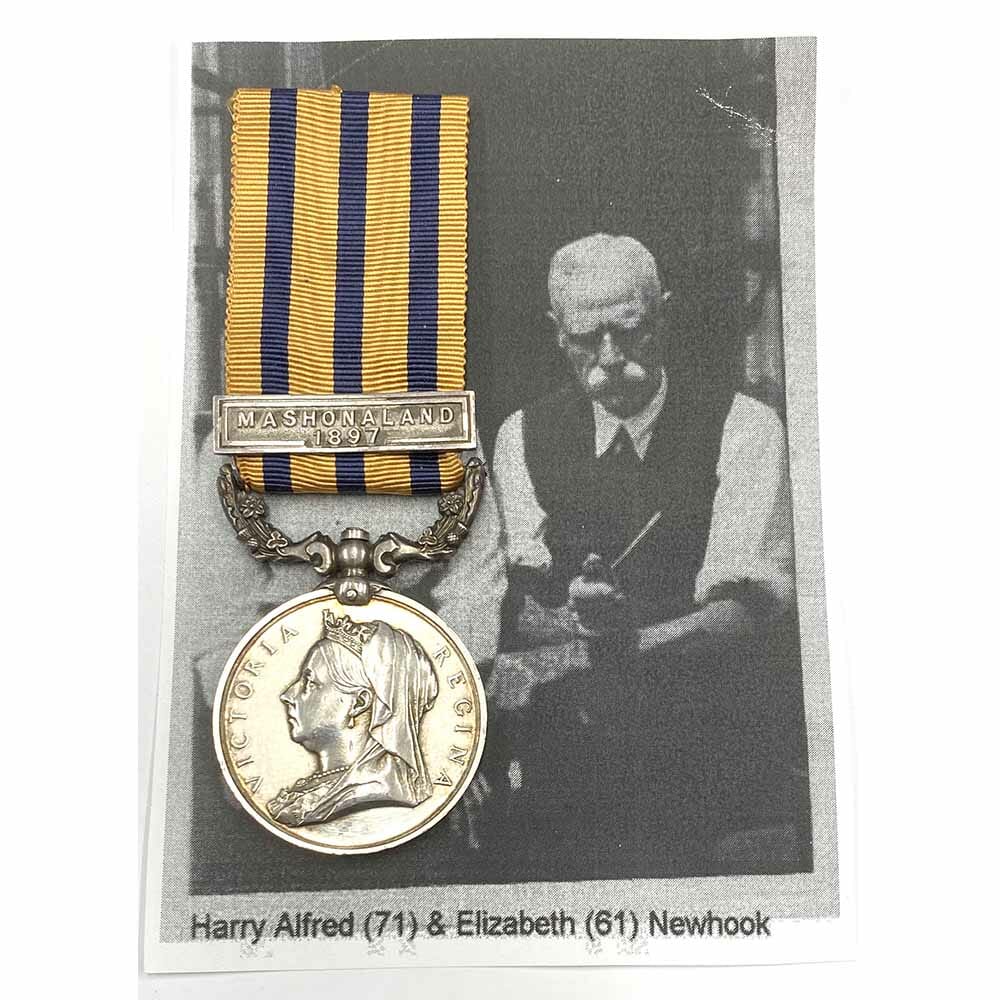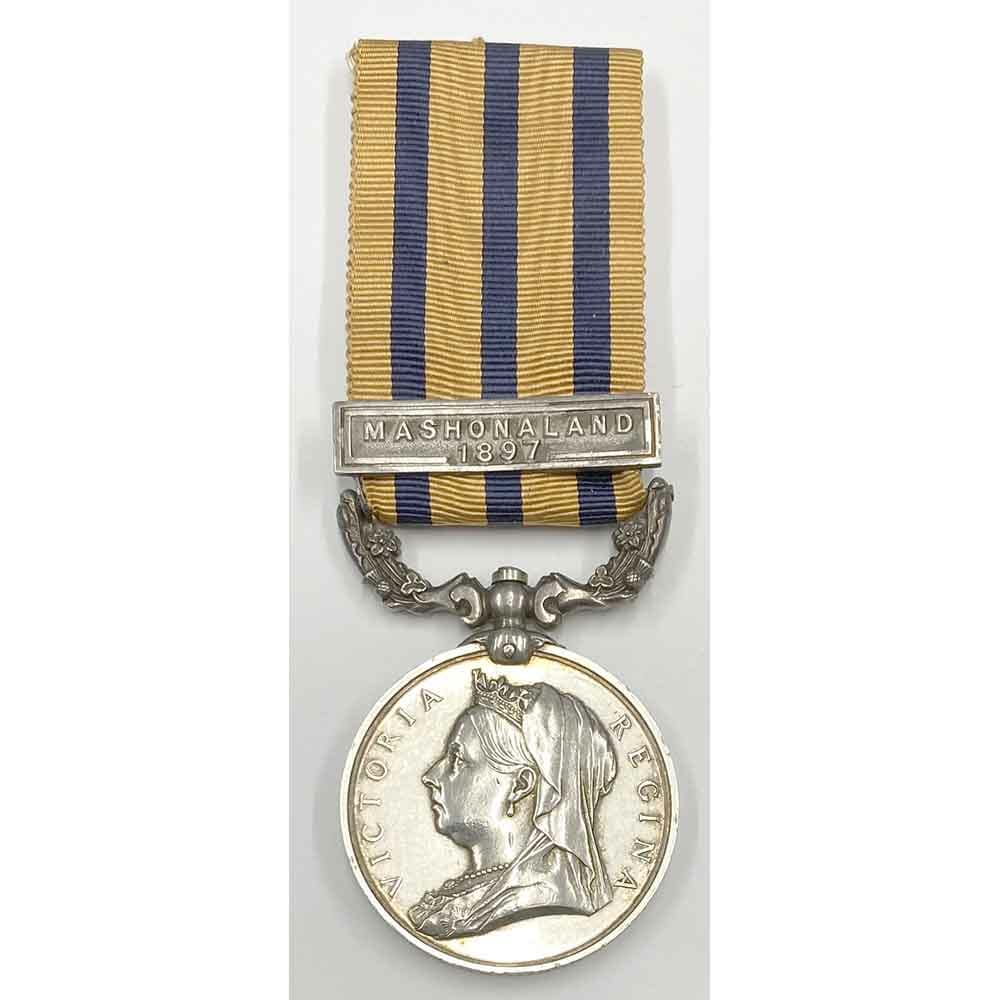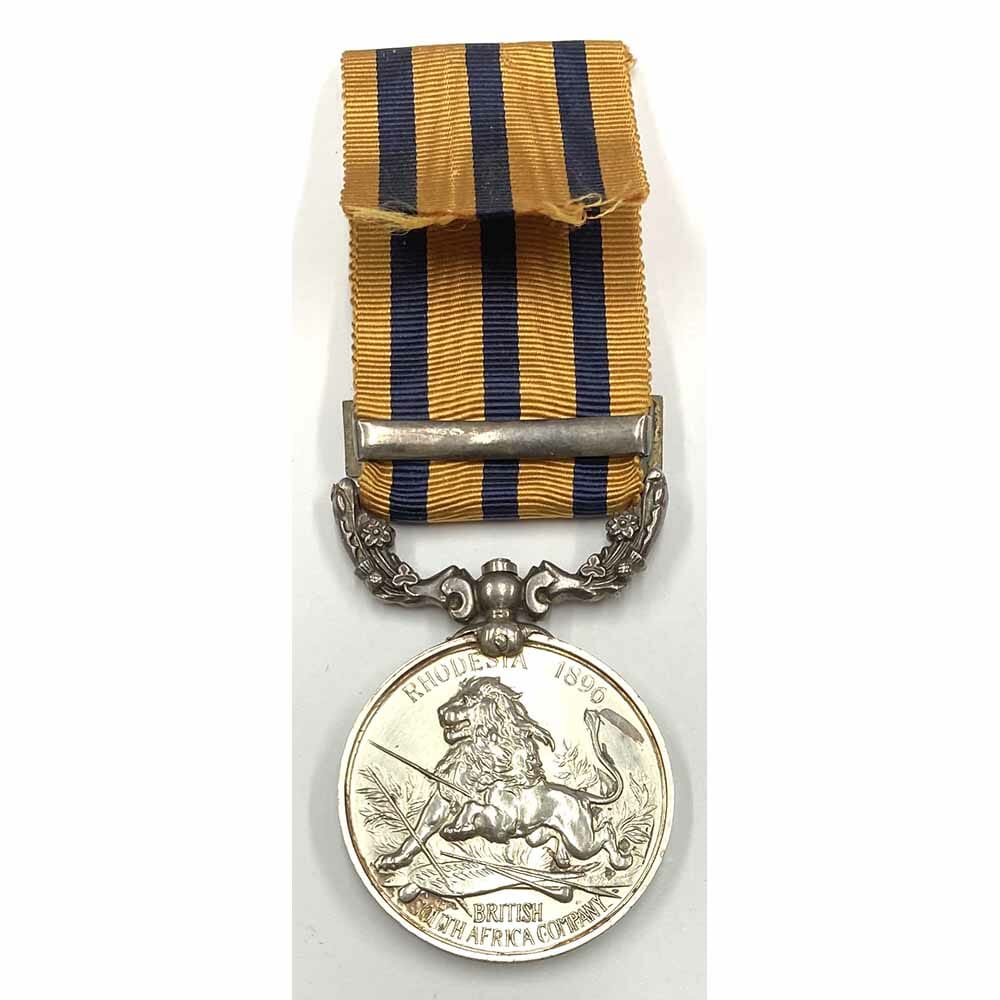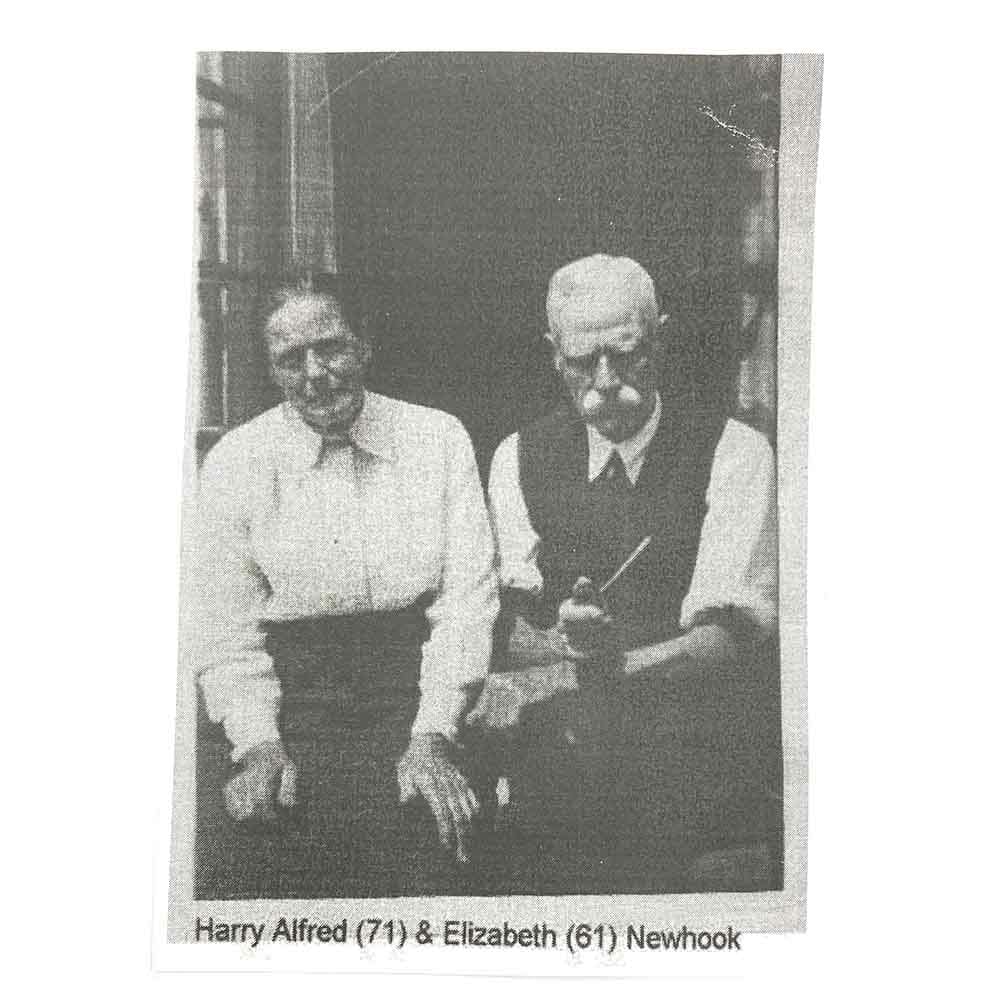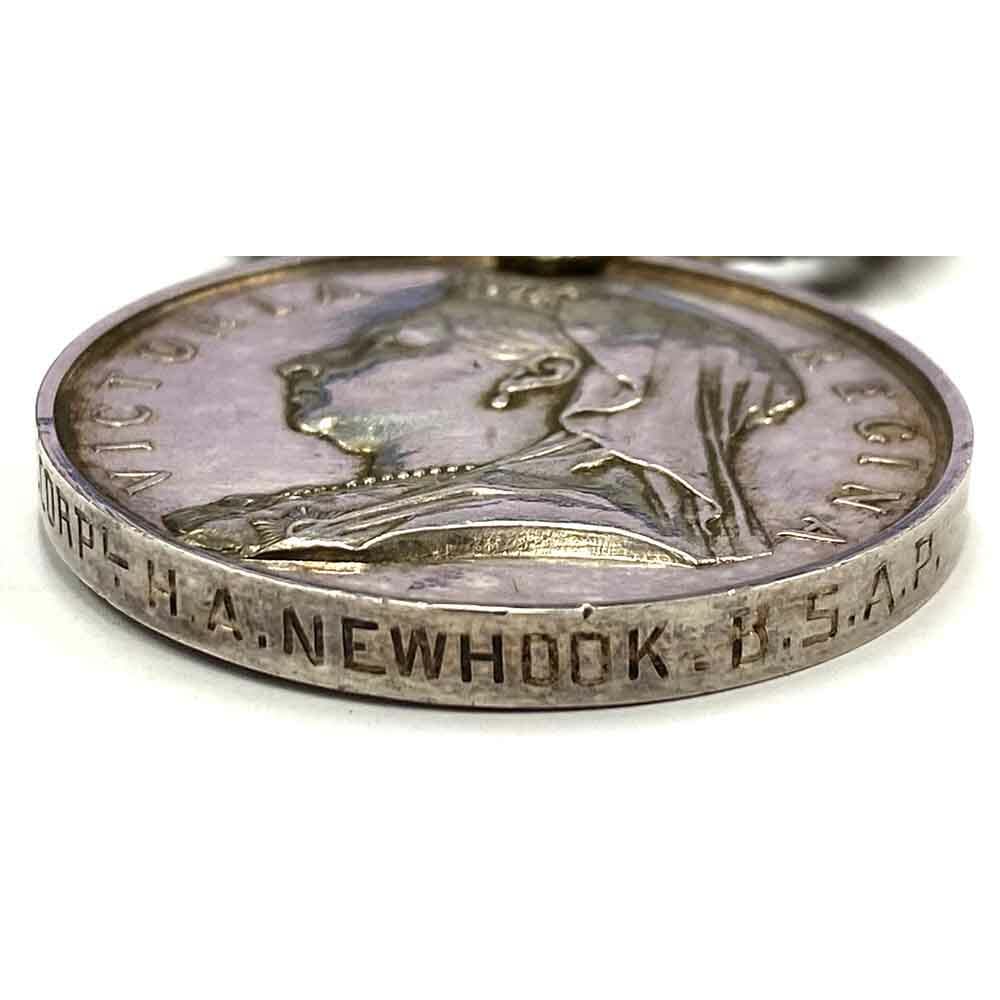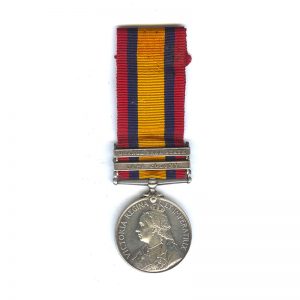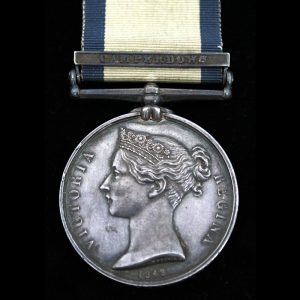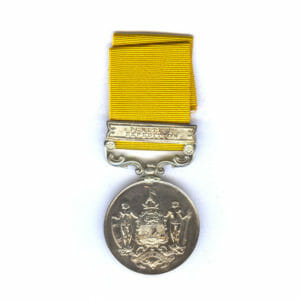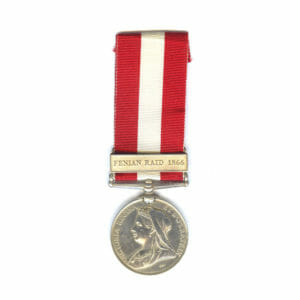Description
British South Africa Company, reverse Rhodesia 1896, bar Mashonaland 1897, 137 Corporal Harry Alfred Newhook, British South Africa Police, former Trooper Natal Mounted Police as a young man in the Zulu war of 1879.
Officially engraved: “137. Corpl. H. A. Newhook. B.S.A.P.”
Harry Alfred Newhook was born in Hampshire, in an Aldershot Police Station on 19th June 1861, where his father William Newhook, was a Policeman, his mother Olive Ann Carrell was a Dressmaker. The 1861 Census lists 9 month old Harry to have been born in “Aldershot Police Station”.
Living in Hampshire, he had close access to the docks and next appears in South Africa on 22nd April 1878 when he was only about 17-18 years old, when he enlisted with the Natal Mounted Police as a Trooper.
During the Zulu War of 1879, He was one of only about 131 men of the Natal Mounted Police to cross the border and fight in the war under the Command of Major J G Dartnell.
For 34 of the 131 men, they met their end at the Battle of Isandhlwana where they were killed in action, with about 6 lucky escapers and 3 Men of the unit were at the Defence of Rorkes Drift.
For young Trooper Newhook he was one of the 97 who went out the day before the massacre, under command of Major Dartnell, who had taken around 100 men with him on a patrol to scout out the Zulu Army.
On the evening of the Battle of Isandhlwana the patrol returned to the camp, to scenes of true horror, where they then spent the night in the devastated camp and left to depart for Rorke’s Drift the next morning where they ran into the gallant survivors of the station.
The muster roll on which he is noted is of the Natal Mounted Police and was recorded at Rorke’s Drift on the morning after the Battles of Isandlwana and Rorke’s Drift in order to find out the names of the missing men. It was publishedby W J Clarke in his 1893 history of the NMP. Service numbers and initials have been added and the spelling of names follows that on the NMP enlistment roll. The men were awarded the South Africa Medal (1877-79) with the 1879 clasp.
The muster roll names all the Natal Mounted Policemen who were part of the Colonial mounted force that crossed into Zululand with the Central Column under the command of Lord Chelmsford. The list identifies the 34 men who were at Isandlwana and three who were at Rorke’s Drift when these camps were attacked by the Zulus. The remaining 97 men must have been with the patrol led by Major Dartnell that went in search of the Zulu army the day before the attacks on Isandlwana and Rorke’s Drift. They returned to the Isandlwana camp on the evening of the battle, spent the night in the devastated camp and left for Rorke’s Drift early the following morning. The parade during which the muster roll was compiled took place after the men were given a meal of tinned meat, bread and rum, the first food for many of them in 60 hours.
Trooper Newhook is on the medal roll confirming he earned the South Africa “Zulu” War Medal, with the bar for 1879.
Not long after the end of the Zulu War, began the “Transvaal Rebellion”, more commonly known as the 1st Anglo Boer War, where Trooper Newhook was once again in action.
During the war as Major General Sir George Colley had no imperial cavalry under his command, a detachment from the Natal Mounted Police was employed in that role as a mounted presence on the Transvaal Border. They remained on service from December 1880 until 30th March 1881.
This consisted of 3 Officers, Major Dartnell, Inspector Mansel and Sub-Inspector Phillips. With 3 Sergeants, 6 Corporals, 2 Trumpeters and Newhook as one of the about 57 Troopers present.
This little war managed to be one of the biggest disasters the British Forces have ever encountered, being outsmarted and outgunned by what was essentially a bunch of angry farmers, who managed to pioneer Guerilla Warfare and employ marksmanship rivalling the best shots of the British Army.
For the war, naturally no medals or clasps were issued, in order to hide their defeat, however Major Dartnell for his command of the Natal Mounted Police was decorated with a C.M.G.
Newhook rose to the rank of Sergeant before his discharge after 8 years on 26th August 1886.
On 14th August 1882 he married Susanne Warne Hamilton in Pietermaritzburg, Natal, South Africa, a Scottish Girl from Lanark who had somehow ended up in South Africa.
He went to enjoy some peace spending some years as Chief Accountant in the Akrokerri, Ashanti Mines from September 1886.
However the peace did not last too long, by the time of the Second Matabele War/Rebellion of 1896-7 in Rhodesia, his experience with the Mounted Police landed him a role of Corporal of the newly formed British South Africa Police, where he took part in the war, followed by the earning of his Matabeleland bar for the second half of the war during 1897.
After a long time spent in South Africa, and now divorced since about 1890, he finally returned home and in 1901 was working as a Clerk in the War Office, living with the Fleming Family, at the Bald Faced Stag Inn in Edward Road, Shirley.
By 1911 he was working as a Dock Checking Clerk in Shirley, with the Thorpe Family, where he was a Boarder, eventually marrying Elizabeth Thorpe, the head of the household, also a Widower, the next year in Southampton.
He had a Son in 1912, Harry Mervyn James Newhook, who served since 1940 with the Royal Artillery in WW2, and a Daughter, Olive Kathleen Nora Newhook, born 1914.
He continued his work as an Accountant, volunteering his services once more for WW1, with the humble role as a Clerk in the Army Pay Department of the Rifle Depot. However for his services in the Boer War and WW1 he was not entitled to any extra medals as he was not on active service.
He lived to the age of 75 and died at Borough Hospital in Southampton on Christmas Day, 25th December 1936.
